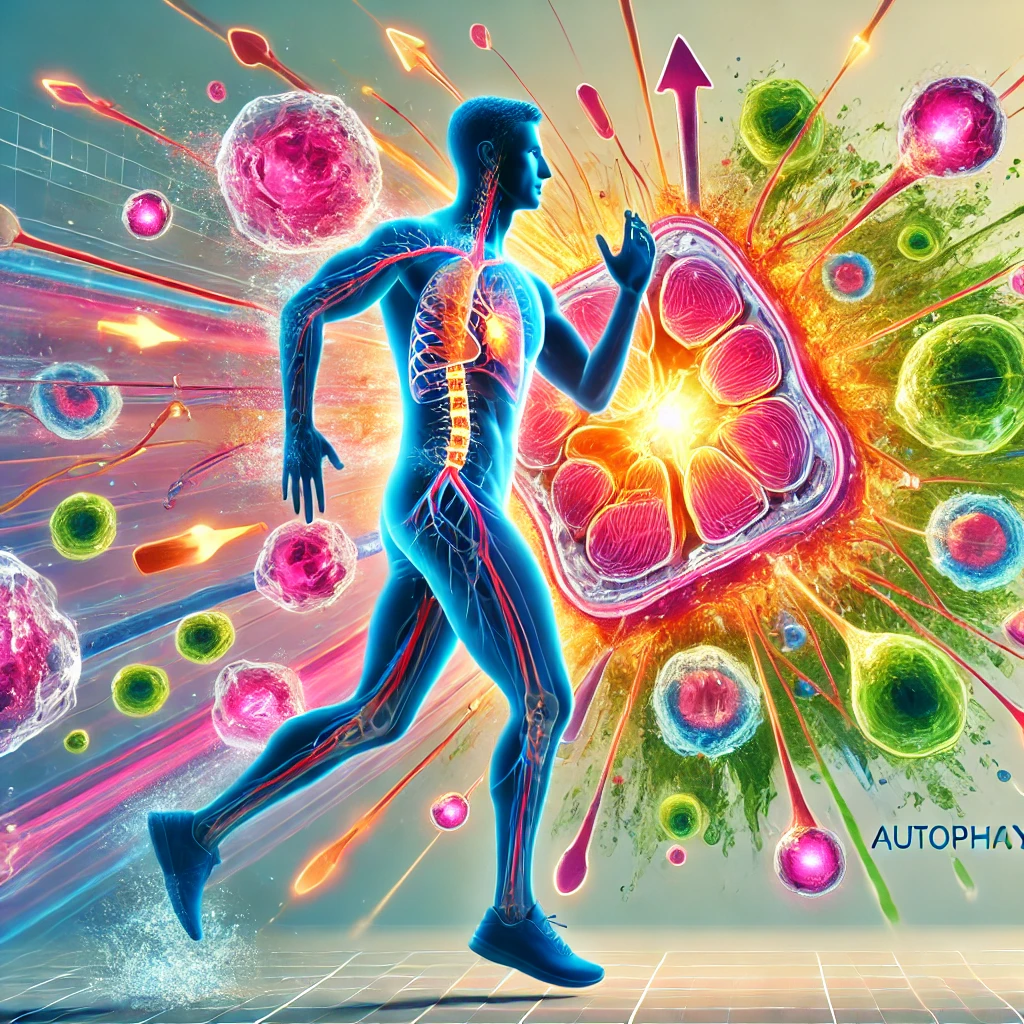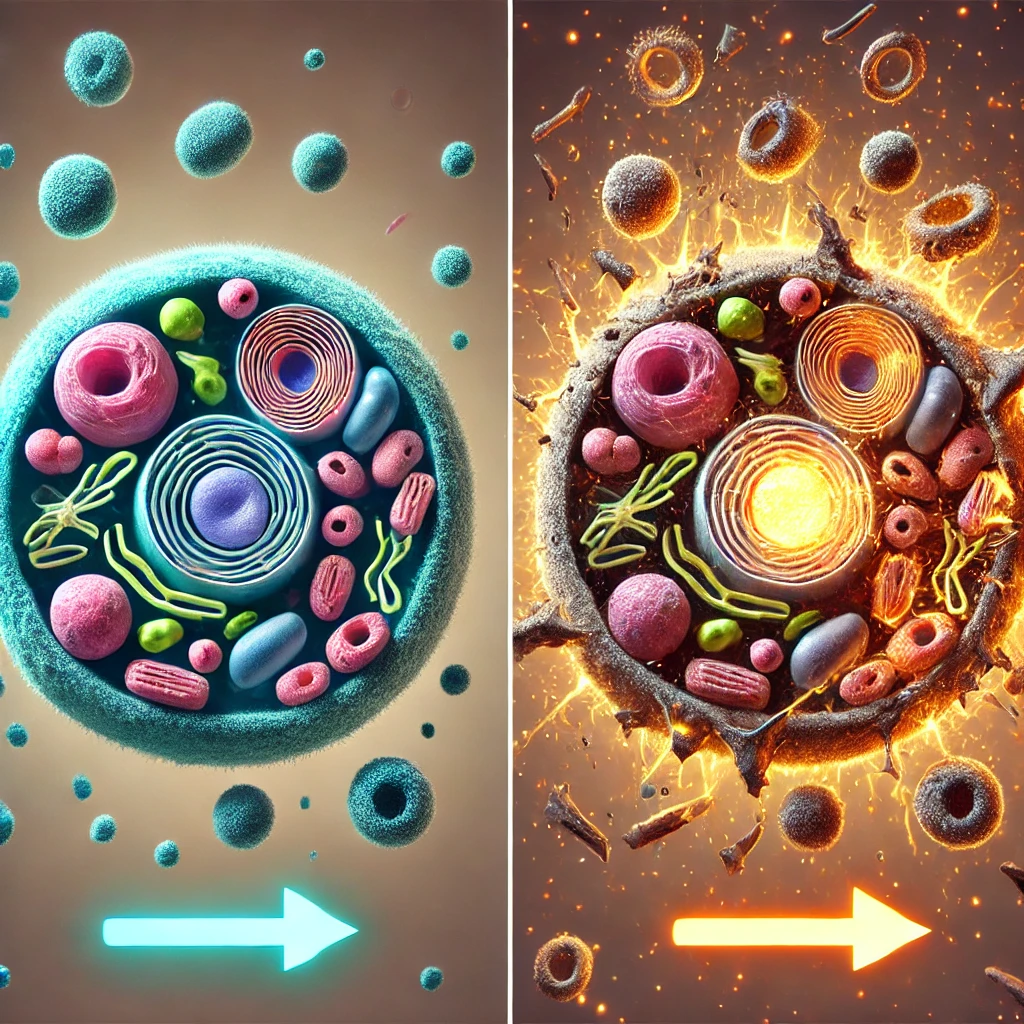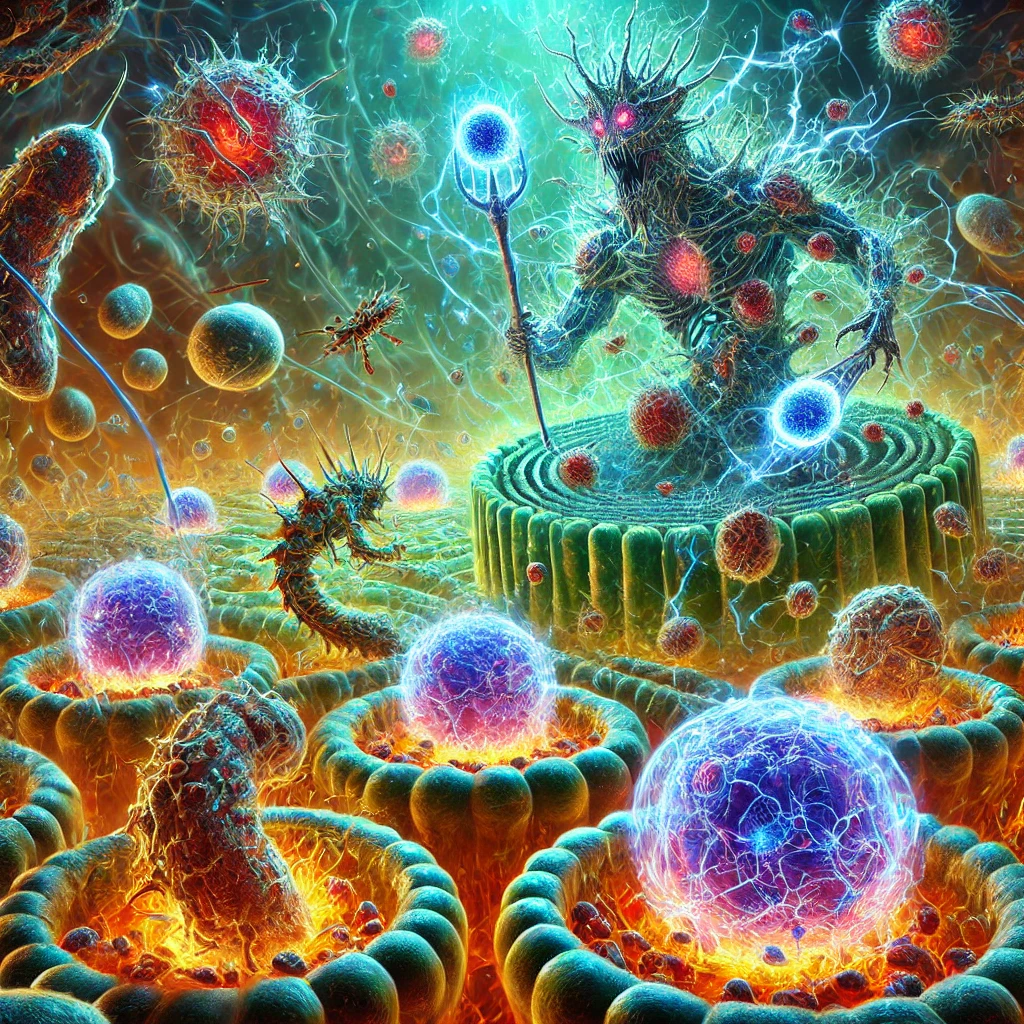
Imagine if your home could clean itself—cluttered shelves reorganized, broken furniture repaired, and even useless trash transformed into something useful. Now, picture this happening inside your body. Sounds like something out of science fiction, right? Surprisingly, this is no fantasy. It’s a process called autophagy, a bizarre, miraculous biological mechanism that has fascinated scientists and health enthusiasts alike.
From ancient fasting rituals to cutting-edge research in anti-aging, autophagy has been whispered about in both wellness circles and scientific laboratories for decades. But what exactly is it? And why does it matter? Let’s take a closer look at the “self-cannibalizing” system your body uses to stay alive—and why it may hold the key to immortality.
What Is Autophagy? A Quick (and Strange) Overview
The term autophagy comes from the Greek words “auto” (self) and “phagy” (eating), which literally translates to “self-eating.” While the idea of your cells cannibalizing themselves sounds macabre, autophagy is anything but destructive. Think of it as your body’s high-tech recycling system—a way for cells to clean out their junk, reuse parts, and keep themselves functioning like a well-oiled machine.
The process works like this: when cells are under stress—whether from aging, lack of nutrients, or even exercise—they begin to break down and digest their own damaged parts. This includes broken proteins, malfunctioning mitochondria (the cell’s power plants), and even harmful invaders like bacteria or viruses. Instead of letting this debris accumulate, the cell disposes of it and uses the salvaged materials to build something new and functional.
In simple terms, autophagy is like Marie Kondo for your body’s cells, tidying up what no longer serves you and sparking joy in the form of renewed health and energy.
The Bizarre Origins: How Starvation Led to Scientific Discovery

While autophagy has only recently become a buzzword in wellness, it’s not a new phenomenon. The process has been silently at work inside living organisms since the dawn of life itself. But it wasn’t until the 1960s that scientists began to truly understand it.
The groundbreaking discovery came when Belgian biochemist Christian de Duve (who later won a Nobel Prize) first noticed that cells have specialized compartments called lysosomes—tiny sacs filled with enzymes that act as the stomachs of the cell. These lysosomes could digest and break down cellular waste. But here’s where things got weird: during times of starvation, cells seemed to go into overdrive, breaking down their own components.
Fast-forward to 2016, and Japanese scientist Yoshinori Ohsumi won the Nobel Prize in Physiology or Medicine for uncovering the detailed mechanics of autophagy. His research revealed just how crucial this process is—not just for cleaning up cellular messes but for fighting diseases, slowing down aging, and even warding off neurodegenerative disorders like Alzheimer’s.
The Magic of Autophagy: Why It’s Good for You

If autophagy sounds like a biological miracle, that’s because it kind of is. Here are just a few reasons why this self-eating mechanism is critical for your health:
- Fights Cellular Aging
Autophagy helps cells stay youthful by breaking down and removing damaged components that would otherwise accumulate over time. Think of it as a cellular fountain of youth. - Prevents Diseases
Accumulated junk in cells can lead to chronic diseases like cancer, Parkinson’s, and Alzheimer’s. By clearing out these harmful buildups, autophagy acts as a preventative measure. - Boosts Immunity
Autophagy doesn’t just clean house; it also gets rid of intruders like viruses and bacteria, making your immune system more efficient. - Enhances Longevity
Studies on animals suggest that activating autophagy can significantly extend lifespan. Some researchers even believe it could one day help humans live longer, healthier lives. - Improves Metabolism
By recycling unused or damaged molecules, autophagy keeps your metabolism running smoothly. It’s even been linked to better weight management and insulin sensitivity.
Triggering Autophagy: Fasting, Exercise, and Stress

Here’s the kicker: autophagy doesn’t happen all the time. It’s a survival mechanism that your body only activates under specific conditions, often when it’s under stress. In fact, one of the most effective ways to trigger autophagy is fasting.
When your body runs out of external food sources (like the meal you just ate), it starts looking inward for energy, breaking down its own cellular components for fuel. This triggers autophagy and sets the recycling process in motion.
Other ways to activate autophagy include:
- Exercise: Intense workouts create stress in your cells, which stimulates autophagy as a way to repair the damage and build stronger muscles.
- Caloric Restriction: Eating less (without full-on fasting) can also encourage your body to enter autophagy mode.
- Ketosis: A high-fat, low-carb diet like the ketogenic diet can mimic fasting conditions by depleting glycogen stores and forcing your body to burn fat for fuel.
But don’t overdo it! Too much fasting or extreme exercise can backfire, causing more harm than good. As with anything in biology, balance is key.
The Dark Side of Autophagy: When Cleaning Goes Wrong

Of course, no biological process is perfect, and autophagy is no exception. While it’s generally beneficial, there are rare instances where the process can backfire. For example, some cancer cells have learned to hijack autophagy, using it to fuel their rapid growth and evade destruction.
Additionally, excessive autophagy can lead to cell death, particularly if healthy components of the cell are mistakenly targeted for destruction. Scientists are still trying to unravel the complexities of when and how autophagy turns from friend to foe.
Autophagy and the Future: Can It Unlock Immortality?

The more we learn about autophagy, the more tantalizing its possibilities become. Could we one day harness this process to slow aging, prevent diseases, or even achieve immortality? While such ideas may seem far-fetched, researchers are actively exploring therapies that could mimic or enhance autophagy to treat everything from cancer to neurodegenerative disorders.
Some scientists believe that intermittent fasting or caloric restriction could become mainstream tools for promoting longevity, while others are working on drugs that could “turn on” autophagy without the need for dietary changes.
The bottom line? Autophagy may not be a household term yet, but it’s a biological process worth keeping an eye on. Who knows? The secret to living a longer, healthier life might already be hiding in your cells, quietly tidying up while you go about your day.
Conclusion: Your Body’s Inner Janitor
In the end, autophagy is a reminder of how incredible—and strange—the human body truly is. This self-eating mechanism, which sounds like the plot of a sci-fi horror movie, is actually one of the most important processes keeping us alive. Whether you’re fasting for health reasons, exercising to stay fit, or simply marveling at the wonders of biology, autophagy is working behind the scenes to keep your cells clean, your body strong, and your life a little longer.
So the next time you hear about someone skipping breakfast for “health reasons,” just remember—they might be letting their cells take out the trash.



I have to voice my respect for your kind-heartedness for those people that need help with your issue. Your real dedication to getting the solution all over appears to be rather powerful and has specifically made guys just like me to arrive at their objectives. Your personal interesting facts signifies this much to me and somewhat more to my colleagues. Many thanks; from each one of us.
Some genuinely good info , Gladiolus I found this. “The problem with any unwritten law is that you don’t know where to go to erase it.” by Glaser and Way.
Very interesting information!Perfect just what I was searching for! “The only limit to our realization of tomorrow will be our doubts about reality.” by Franklin Delano Roosevelt.
Thanks for one’s marvelous posting! I certainly enjoyed reading it, you might be a great author.I will remember to bookmark your blog and will often come back very soon. I want to encourage you to definitely continue your great job, have a nice weekend!
When I originally commented I clicked the “Notify me when new comments are added” checkbox and now each time a comment is added I get three emails with the same comment. Is there any way you can remove people from that service? Many thanks!
Hmm it appears like your blog ate my first comment (it was extremely long) so I guess I’ll just sum it up what I submitted and say, I’m thoroughly enjoying your blog. I as well am an aspiring blog writer but I’m still new to everything. Do you have any helpful hints for beginner blog writers? I’d certainly appreciate it.
I’m not sure where you’re getting your info, but good topic. I needs to spend some time learning much more or understanding more. Thanks for excellent info I was looking for this info for my mission.
I intended to post you this tiny note in order to thank you so much once again just for the magnificent suggestions you have shared above. It is quite surprisingly generous of you to present without restraint all a few individuals could possibly have advertised for an ebook to end up making some profit for themselves, primarily considering the fact that you could have done it in the event you considered necessary. The secrets likewise served to become good way to recognize that most people have the same dreams just like my very own to grasp a little more concerning this matter. I’m certain there are many more pleasant opportunities up front for people who find out your blog.
Just what I was searching for, thanks for posting.
Well I definitely enjoyed reading it. This post procured by you is very practical for good planning.
so much great information on here, : D.
Great wordpress blog here.. It’s hard to find quality writing like yours these days. I really appreciate people like you! take care
Along with every little thing that appears to be developing within this area, your points of view are generally quite exciting. Even so, I appologize, but I can not subscribe to your entire suggestion, all be it exciting none the less. It would seem to everybody that your opinions are actually not entirely validated and in actuality you are generally yourself not even fully confident of the point. In any case I did take pleasure in reading it.
Almost all of what you assert is supprisingly precise and that makes me ponder why I hadn’t looked at this with this light before. Your article really did switch the light on for me personally as far as this particular subject goes. But there is actually 1 point I am not too comfy with so whilst I make an effort to reconcile that with the main theme of the position, permit me observe what the rest of the visitors have to say.Nicely done.
Thank you for sharing superb informations. Your web site is so cool. I’m impressed by the details that you’ve on this web site. It reveals how nicely you understand this subject. Bookmarked this website page, will come back for more articles. You, my friend, ROCK! I found just the info I already searched all over the place and just could not come across. What a great web site.
I really like assembling useful information , this post has got me even more info! .
Hi there would you mind stating which blog platform you’re working with? I’m looking to start my own blog soon but I’m having a difficult time choosing between BlogEngine/Wordpress/B2evolution and Drupal. The reason I ask is because your design and style seems different then most blogs and I’m looking for something unique. P.S Apologies for getting off-topic but I had to ask!
Thank you for another informative web site. Where else could I get that type of info written in such a perfect way? I have a project that I’m just now working on, and I have been on the look out for such information.
I’ve been absent for a while, but now I remember why I used to love this site. Thanks, I’ll try and check back more frequently. How frequently you update your website?
You made some nice points there. I did a search on the subject matter and found most guys will consent with your site.
I gotta bookmark this website it seems very beneficial very beneficial
certainly like your website however you have to check the spelling on several of your posts. Many of them are rife with spelling issues and I in finding it very troublesome to tell the reality then again I?¦ll definitely come again again.
With every thing which seems to be developing throughout this subject matter, a significant percentage of perspectives are actually quite stimulating. Having said that, I appologize, but I can not subscribe to your whole idea, all be it radical none the less. It appears to everybody that your comments are actually not completely justified and in fact you are your self not really entirely certain of your argument. In any case I did enjoy examining it.
You are a very clever individual!
Thanks , I have recently been looking for information approximately this topic for a long time and yours is the best I’ve discovered till now. However, what in regards to the bottom line? Are you positive about the supply?
Wow, superb blog layout! How long have you been blogging for? you make blogging look easy. The overall look of your web site is excellent, as well as the content!
My brother suggested I might like this web site. He was entirely right. This post actually made my day. You cann’t imagine just how much time I had spent for this info! Thanks!
I will immediately grasp your rss feed as I can not to find your email subscription link or newsletter service. Do you have any? Kindly permit me understand in order that I may just subscribe. Thanks.
My brother recommended I may like this web site. He was entirely right. This post truly made my day. You can not believe simply how so much time I had spent for this information! Thank you!